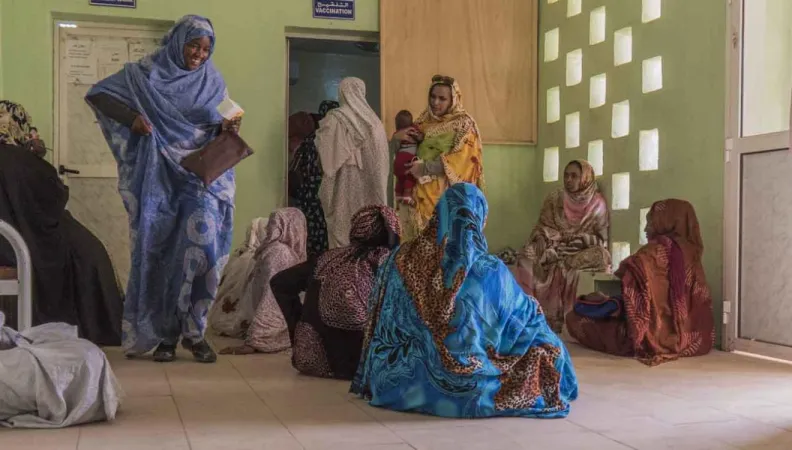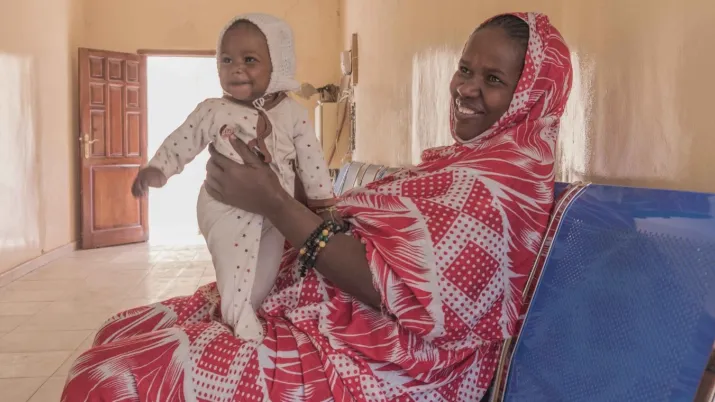Share the page
Mauritania: “Quality maternal health requires blood transfusion capability”
Published on

In Nouakchott, the new National Blood Transfusion Center marks a turning point in the fight against maternal mortality. With postpartum hemorrhage the leading cause of maternal deaths in Mauritania, access to blood is a top health priority. With support from AFD, the country is modernizing its health system to protect a greater number of women, and their children.
The recent laying of the foundation stone of the new National Blood Transfusion Center (Centre National de Transfusion Sanguine – CNTS) in Nouakchott marked not only the start of construction – it was also a sign of a concrete commitment to maternal health. Complications in childbirth are common, and when they do occur, blood availability often makes a difference: in 2023, the rate of maternal deaths in Mauritania was still 381 per 100,000 live births – far from the target of 70 set by the UN for 2030. Postpartum hemorrhage is the cause of maternal death in most cases, and it happens too often that hospital reserves lack the blood that could save patients.
A long-standing national priority
Faced with this situation, Mauritania has made maternal health a national cause. The country has initiated ambitious policies to protect mothers since the end of the 1990s through the Safe Motherhood in the Wilaya of Nouakchott program. Of these, one of the most illustrative is the obstetrical risk insurance (ORI) scheme, introduced in 2002 in the capital. By removing financial barriers to childbirth, this system has enabled access to care for thousands of women. French development cooperation provided solid support, helping to extend this project to several regions of the country, and the Mauritanian Ministry of Health eventually decided to make it a public health policy.
“Our institutions have come to truly understand the challenge,” says Fatimetou Moulaye, one of the drivers of this change, as coordinator of the National Reproductive Health Program, which she joined in 1996. Today, the ORI scheme is one aspect of broader reflection on universal health coverage, with the Mauritanian State bearing an increasing share of costs and thereby reducing the financial burden on women.
See also: An obstetrical risk insurance scheme to improve maternal and child health in Mauritania
AFD, a partner over the long term
AFD Group is committed to being a transformation lever to support this process. We have been bolstering Mauritania’s efforts to improve maternal health for more than 20 years. Our support helped expand the ORI scheme between 2008 and 2017 with the financing of three projects that spread the scheme to nearly all the regional capitals. We supported a pragmatic overall strategy that included training of staff, modernization of facilities, provision of ultrasound equipment, and access to essential medicine. The results were conclusive: the rate of assisted births increased from 54% in 2000 to 66% in 2011, and the use of health facilities doubled in the areas covered by the scheme.
The challenge is also a logistical one, as nearly 30% of Mauritania’s population is concentrated in the capital and the rest scattered over the vast remaining part of the country. But outside the capital, AFD support has helped equip the Kiffa Regional Blood Transfusion Center. As Dr. Khadijetou Ba, the current director of the CNTS says, “A woman who gives birth in Néma or Atar needs as much blood as in Nouakchott.”
See also: Better Care for Pregnant Women, Young Mothers and Infants
The game-changing CNTS
“In 2017, when I took over the management of the CNTS, I discovered a facility that was overwhelmed and unable to meet growing demand,” says Dr. Khadijetou Ba. With backing from WHO, she responded to this urgent situation by developing an ambitious national plan to reform and modernize the blood transfusion system. But then a partner who could turn this vision into reality was needed. AFD Group was the first to step up to the challenge.
Our support led to the training of specialized personnel, the purchase of modern equipment, and the development of a strategic framework consistent with the national health priorities. Annual collection capacity is currently between 12,000 and 18,000 bags, but the new CNTS will help triple that amount. The goal is to reach transfusion self-sufficiency. This target, which requires a donor rate of between 1 and 2% of the country’s population, corresponds to about 50,000 to 100,000 bags per year, in line with WHO recommendations.
A step closer to achieving the Sustainable Development Goals
This project is one aspect of an overall ambition to which Mauritania is committed: reduction of maternal mortality by 2030, in accordance with Sustainable Development Goal 3.1. The new CNTS is more than just infrastructure, it’s an essential lever to one day enable every woman to give birth in safe conditions, no matter where she lives in Mauritania. This will require accessible facilities, trained staff, availability of drugs, functional laboratories, and especially blood – lots of blood.
Further reading
Mauritania: A Pre and Postnatal Plan for Pregnant Women
In healthcare in Sub-Saharan Africa, the stakes are high when it comes to the welfare of pregnant women and mothers before and after delivery. To tackle soaring maternal mortality rates, Mauritania i...
Published on March 8, 2022

